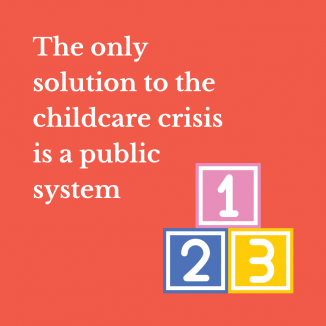The only solution to the childcare crisis is a public system, says NWC
Published: Thursday, August 22, 2024

The only solution to the childcare crisis is a public system, says NWC
The National Women’s Council say a public system of Early Childhood Education and Care could be piloted alongside private provision to ensure every child in the country has a place
The National Women’s Council (NWC) has said a public system of Early Childhood Education and Care is the only common-sense solution to the childcare crisis currently engulfing the country. This month, as more providers pull out of the Government’s core funding scheme in order to increase their fees, many parents will face tough decisions about whether to pay the fees or leave work and take on childcare themselves. In the vast majority of cases, women will be the ones making this decision.
Rachel Coyle, Head of Campaigns and Mobilisation at NWC, said:
“The current model, where public money props up private provision, is simply not working. It’s not working for parents, it’s not working for children, and it especially is not working for gender equality. We need a system that creates stability, guarantees a place for every child in the country, one that gives parents choices, and eradicates the volatility in fees that we are seeing this year.”
NWC has long called for a public system of Early Childhood Education and Care as a crucial piece in the puzzle for women’s equality. Public childcare has been shown time and again to improve women’s participation in the workforce, in education, in the arts and culture, and in sports. In short, it allows women to fully participate in our society. This is especially true for lone parents, the vast majority of whom are women.
NWC’s Care Officer, Eilish Balfe, said:
“A public system of Early Childhood Education and Care, akin to our primary school system, will naturally take a lot of planning and is not an overnight solution. However, it is the only sustainable solution for the future. In 2021, the government spent €638m on childcare, and in 2024 they spent €1.1bn. Despite doubling the investment, the crisis keeps growing. They need to change tactics.
Government could pilot a public scheme in Budget 2025, alongside continued support for private provision so that there is no cliff-edge for parents, children, or providers. And long-term we want to see a commitment to the public system in the next programme for government.”
With an election on the horizon, NWC is building an Alliance for Public Early Childhood Education and Care. This Alliance will be launched in September. We are encouraging political parties to commit to a public system of childcare in their election manifestos. Women have waited long enough.
Ends/
For comment: Eilish Balfe and Rachel Coyle
For more information, please contact Sinéad Nolan, NWC Communications and Social Media Coordinator on sineadn@nwci.ie
Notes:
About NWC
The National Women’s Council is the leading national representative organisation for women and women’s groups in Ireland, founded in 1973. We have over 190 member groups and a large and growing community of individual supporters.
The ambition of the National Women’s Council is an Ireland where every woman enjoys true equality and no woman is left behind. This ambition shapes and informs our work, and, with our living values, how we work.
We are a movement-building organisation rooted in our membership, working on the whole island of Ireland. We are also part of the international movement to protect and advance women’s and girls’ rights. Our purpose is to lead action for the achievement of women’s and girls’ equality through mobilising, influencing, and building solidarity. Find out more on www.nwci.ie
